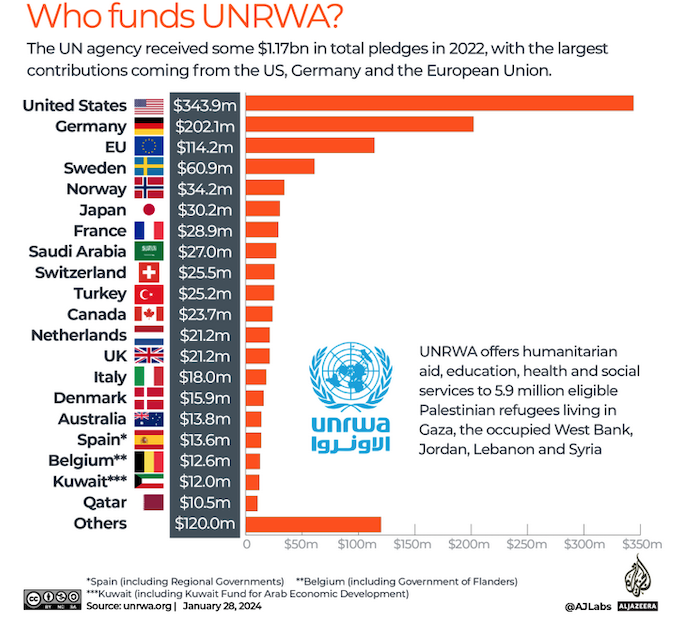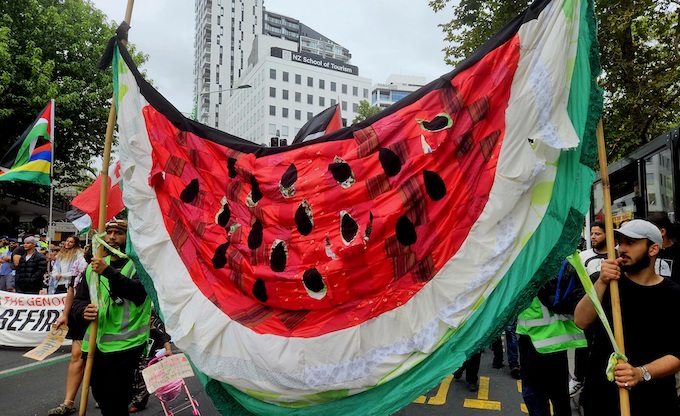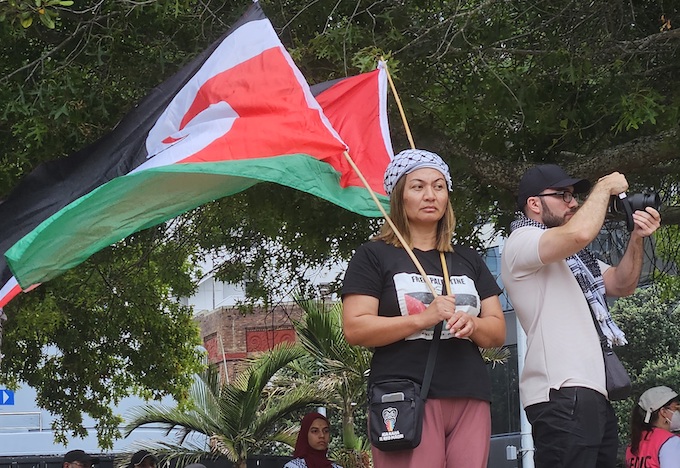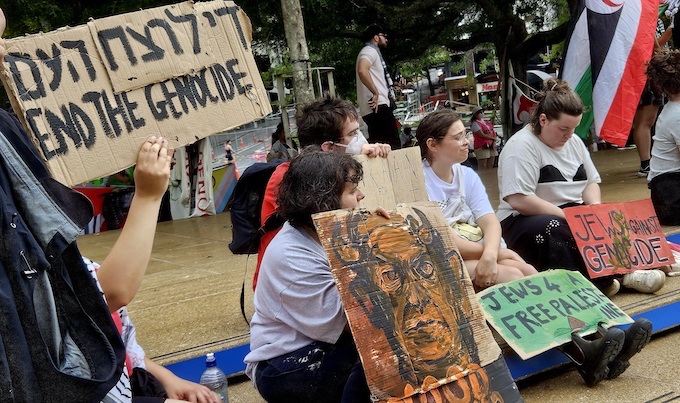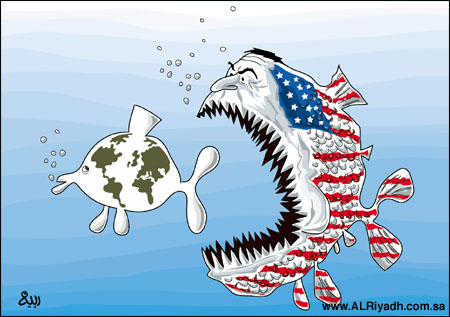
Premise
Consider this paradox: without the Soviet Union (U.S.-designated nemesis since 1917), the United States would have never succeeded at placing the planet under its unilateral grip—often referred to by U.S. imperialists as the “new world order”. Or, rephrased differently, a world whereby the U.S. wants to rule unchallenged. This how it started: first, forget the Soviet Politburo—Mikhail Gorbachev practically annulled its role as the supreme decision-maker body of the Soviet Communist Party before proceeding to dismantle the Soviet state. In sequence, he, his foreign minister Eduard Shevardnadze, other anti-communists in his inner circle, and the Yeltsin group were the material instruments in the downfall of the USSR thus leading to U.S. success.
By a twist of events, with its unrelenting policy of economic, geopolitical, and military pressure to submit the new Russia to its will, the United States effectively forced it to intervene in Ukraine many years later. After 33 years from the dismantling the Soviet Union (first by Gorbachev’s contraptions of perestroika and glasnost, and then by Yeltsin’s pro-Western free-marketers), Russia is now breaking up the monstrous American order it helped create. Today, it seems that Russia have reprised its founding principles in the world arena—not as an ideologically anti-imperialist Soviet socialist republic, but as an anti-hegemonic capitalistic state.
The process for the U.S. world control worked like this: taking advantage of Gorbachev’s dismantlement of the socialist system in Eastern Europe and his planned breakup of the USSR, the United States followed a multi-pronged strategy to assert itself as the sole judge of world affairs. The starting point was the Iraqi occupation of Kuwait. With the success of its two-stage war to end that occupation (Operations: Desert Shield, 1990, and Operation: Desert Storm, 1991) the United States achieved multiple objectives. Notably, it removed the USSR completely from the world scene even before it was officially dismantled, and it put Iraq and the entire Arab world under its effective control, and it tested its new world order.
Far more important, with a considerably weakened Russia taking the seat of the USSR at the Security Council, the United States finally completed its takeover of the United Nations. Although the hyperpower is known for routinely operating out of the international norms and treaties, and has myriad methods to enforce its influence or control over foreign nations, it is a fact that whoever controls the Security Council can use its resolutions—and their ever-changing interpretations— as authorization for military interventions in the name of so-called collective international legality.
Still, it is incorrect to say that the United States has become the omnipotent controller without considering the other three permanent members of the Security Council: Britain, France, and China. First, aside from being the two states with a known history of imperialism and colonialism, Britain and France are NATO countries. As such, they pose no threat to U.S. authority. This leaves China. (For now, I shall briefly discuss China’s role vis-à-vis the U.S. taking control of the Security Council after the demise of the USSR, while deferring its relevance to U.S. plans in Ukraine to the upcoming parts)
China has been rising as world power since the early 1990s onward. That being said, China’s world outlook has been consistently based on cooperation and peace among nations. China is neither an imperialist nor expansionist or interventionist state, and its claim on taking back Taiwan is historical, legal, and legitimate. That being said, China’s abstention from voting on serious issues is seriously questionable. Interpretation: China seems primarily focused on building its economic and technological structures instead of antagonizing U.S. policies that could slow its pace due to its [China] growing integration in the global capitalistic system of production. Consider the following two Western viewpoints on China’s voting practices:
- The Australian think tank, Lowy Institute, states, “China used its UN Security Council rotating presidency in August … China did not veto any UN Security Council resolutions between 2000 and 2006.”
Observation: but the period 2000–2006 was the post-9/11 Orwellian environment in which the United States broke all laws of the U.N. and turned the organization into its private fiefdom. Does that mean China had caved in to U.S. pressure and subscribed to its objectives? Based on its history, ideals, stated foreign policy principles, and political makeup, my answer is no. Yet, we do know that China has often been moving alongside U.S. objectives—by remaining silent on them. Examples include the U.S. 13-year blockade of and sanctions on Iraq (starting in 1990 and theoretically ending after the U.S. invasion in 2003), as well post-invasion occupation that is lasting through present by diverse ways and methods.
- Wikipedia (Caveat: never take anything printed on this website seriously unless you verify content rigorously) stated the following on China, “From 1971 to 2011, China used its veto sparingly, preferring to abstain rather than veto resolutions not directly related to Chinese interests. China turned abstention into an “art form”, abstaining on 30% of Security Council Resolutions between 1971 and 1976. Since the outbreak of the Syrian Civil War in 2011, China has joined Russia in many double vetoes. China has not cast a lone veto since 1999.”
Observation: by abstaining, China seems playing politics and patently taking sides with Washington on critical issues. Is china conspiring, in some form, with the U.S. for selfish reasons? Are there other reasons?
No science is needed to prove that China is neither fearful of the United States nor subservient to it or uncertain about its own great place in the world. Simply, China favors dialogue over confrontation and patience over nervous impulses. Although such conduct may unnerve some who want to see China stand up to the hyper-imperialist bully, the fact is, China is no hurry to play its cards before the issue of Taiwan is resolved. Still, by its own problematic actions at the Security Council, China is not a dependable obstacle to U.S. plans. Of interest to the anti-imperialist front, however, is that China’s voting record on Iraq, Libya, and Yemen has left dire consequences on those nations.
Russia’s Intervention in Ukraine: Dialectics
Russia’s intervention in Ukraine was calculated and consequential. It was calculated based on symmetric response to U.S. long-term planning aiming at destabilizing it. The consequentiality factor is significant. Russia’s action did not precede but followed a protracted standoff with Ukraine following U.S.-organized coup in 2014. Not only did that coup topple the legitimate government of Viktor Yanukovych, but also veered Ukraine’s new rulers toward a fanatical confrontation with Russia and ethnic Russians—a sizable minority in Donbass.
Could comparing U.S. and Russian reactions to each other’s interventions shed light on the scope of their respective world policies? How does all this apply to Ukraine? First, Ukraine is not a conflict about territory, democracy, sovereignty, and all that jargon made to distract from the real issues and for the idle consumption of news. Second, to understand the war on Ukraine, we need to place Russia’s intervention in Ukraine in a historical context that —at least since the dismantlement of the USSR.
Premise
The study of reactions by political states to military interventions and wars is an empirical science. By knowing who is intervening, who is approving, and who is opposing, and by observing and cataloging their conduct vis-à-vis a conflict, we can definitely identify pretexts, motives, and objectives. For example, when Iraq invaded Iran in 1980, the reaction of the United States, key European countries, Israel, Arab Gulf states, Egypt, and Jordan were unanimously approving—and supporting with instigation, money, weapons, and logistics. The Soviet Union on the other hand, called for dialogue, negotiation, and other ways to end the conflict.
In the Iraq-Iran War, the U.S., Europe, and Israel wanted the war to continue so both would perish by it. Henry Kissinger the top priest of U.S. Zionism simplified the U.S. objective with these words, “The ultimate American interest in the war (is) that both should lose”. Consequently, Western weapons sales to both contenders skyrocketed—war is business. The Arab Gulf states, for example, financed and wanted Iraq to defeat Iran—its revolutionary model threatened their feudal family systems of government. They also looked for surgical ways to weaken Iraq thus stopping its calls for the unification of Arab states.
It turned out, when the war ended after eight years without losers and winners, that U.S. and Israel’s objective evolved to defeat Iraq that had become, in the meanwhile, a regional power. The opportunity came up when Iraq, falling in the U.S. trap (April Glaspie’s deception; also read, “Wikileaks, April Glaspie, and Saddam Hussein”) invaded Kuwait consequent to oil disputes and debts from its Gulf-U.S.-instigated war with Iran. As for Iran, it became the subject of harsh American containment and sanction regimes lasting to this very date.
Another example is the Israeli invasion of Lebanon in 1982. While the USSR, China, Arab States, and countless others only condemned but did nothing else as usual, Ronald Reagan, on the other hand, approved and sent his marines to break up the Palestinian Resistance and expel it from Lebanon, which was an Israeli primary objective.
United States: Reaction to the Russian Invasion of Afghanistan
When the USSR intervened in Afghanistan in 1979, that country became an American issue instantly. Cold war paradigms played a paramount role in the U.S. response. Not only did the U.S. (with Saudi Arabia’s money) invent so-called Islamist mujahedeen against the Russian “atheists” (operation Cyclone), but also created ad hoc regional “alliances’—similar to those operating in Ukraine today—to counter the Soviet intervention.
Russia: Reaction to U.S.’s many interventions and invasions
When Lyndon Johnson invaded the Dominican Republic (1965), when Ronald Reagan mined the Nicaraguan ports (1981-85), and when George H.W. Bush invaded Panama (1989) and moved its president to U.S. prisons, the USSR reacted by invoking the rules of international law—albeit knowing that said law never mattered to the United States. The Kremlin of Mikhail Gorbachev stated that the invasion is “A flagrant violation of the fundamental principles of the United Nations Charter and norms of relations among states”.
But did he do anything to hold the U.S. accountable? Gorbachev knew well that words are cheap, and that from an American perspective such charter and norms are ready for activation only when they serve U.S. imperialist purpose. The U.S., of course, did not give a hoot to Gorbachev’s protestation—and that is the problem with Russian leaders: they avoid principled confrontation with the futile expectation that the United States would refrain from bullying Russia. One can spot this tendency when Russian leaders kept calling U.S. and European politicians “our partners” while fully knowing that the recipients are probably smirking in secret.
Another catastrophic example is Gorbachev’s voting (alongside the United States) for the U.N. Resolution 678 to end Iraq’s occupation of Kuwait by January 15, 1991. According to my research, that was the first time in which a resolution came with a deadline. Meaning, the United States (and Gorbachev) were in a hurry to implement Bush’s plan for world control.
Not only did the Gorbachev regime approve Resolution 678, but also approved all U.S. resolutions pertaining to Iraq since the day it invaded Kuwait on August 2, 1990. The statement is important. It means that Gorbachev’s role was structurally fundamental in allowing the United States to become the de facto “chief executive officer” of world affairs. At the same time, his role was also the material instrument in turning Russia into a U.S. vassal for over two decades since the dissolution of the USSR. [After becoming a former president of a superpower, Gorbachev made a living by taking commissioned speeches at various U.S. universities and think tanks]
From attentively reading Resolution 678, it is very clear that the objective was not about the withdrawal of Iraq from Kuwait. Decisively, it was about the disarming of Iraq for the sake of the Zionist entity in Palestine. In fact, the U.S. bombing of Iraq in 1991 was never meant just to end that occupation by dislodging Iraqi forces from Kuwait. It was enacted to destroy Iraq’s civilian structures and infrastructures, its army, and its nascent military industry including its nuclear capabilities.
The point: Gorbachev as a convert from communism to capitalism closed his eyes to U.S. objectives in Iraq and the world—these were unimportant to his plan since he obviously tied a deeply altered USSR to the wheel of U.S. imperialism while thinking he and his regime still mattered. With that, he doomed future Russia to protracted hardship and the world to suffer at the hands of U.S. violent imperialists and Zionists.
The Example of Libya: Zionist hyper-imperialist Barack Obama bombed Libya in 2011. [For the record, the Jerusalem Post (top publication in the Zionist state) called Obama, “An insider’s view: Eight years watching the first Jewish US president”. (Describing Obama as Jewish is irrelevant. He was a Zionist at the service of Israel via a constructed career powered by opportunism and sycophancy) Obama’s bombing of Libya is testimony to Russia’s betrayal of just causes when that suits its calculations.
Russia of Dmitry Medvedev (and Putin as his prime minister) explicitly accepted the U.S. plan by not vetoing UNSC 1970, and UNSC Resolution 1973 that declared the whole of Libya a No-Fly Zone. Once the resolution was passed, the U.S. (and NATO) transformed it at once into a colossal bombing of that country. (Debating whether Russian’s general conduct toward U.S. tactics was an expression of pragmatism, concession, collusion, or weakness goes beyond the scope of this work. I reported on Lavrov’s statement on the Libyan issue further down in this series.)
As for the United States, a fascist Hillary Clinton disguised as an “intelligent diplomat” epitomized the U.S. role for government change in Libya as follows. Referring to the brutal murder of former Libyan leader Muammar Gaddafi, Obama’s Secretary of State said, “We came, we saw, he died”. Aside from theatrically debasing Mark Anthony’s famous victory exclamation with her crazed laughter, Clinton’s “WE” confirmed the basics: Odyssey Dawn was a code name, not for a romantic beginning for Libya but for Obama’s imperialist war to conquer its oil and depose its leader.
Two other events are significant for their long-term implications: U.S. invasions of Afghanistan (2001) and Iraq (2003). Regardless of U.S. pretexts, Russia reacted to each invasion differently. In the case of Afghanistan, it sided with the United States in spite of the fact that Afghanistan under the rule of the Taliban had nothing to do with the still very much suspicious attack on the United States on September 11, 2021. It is imperative to recall what Tony Blair said prior to the Anglo-American invasion. Media and public records of the British government can confirm that Blair thundered to the Taliban, “Surrender Bin Laden, or lose power”. The Taliban offered to comply if the U.S. could prove that Bin Laden was behind the attack. The U.S. never responded—it just invaded.
In the case of Iraq, Russia, together with France and Germany, vehemently opposed the planned invasion but only within the realm of the UNSC. The U.S. and Britain invaded nevertheless. Aside from protesting, however, neither Russia nor any other country took any punitive action against the top two imperialist powers. More than that, Russia of the first Putin presidency sent neither weapons nor money to Iraq and Afghanistan to help them fight the invaders. Germany and France did the same. Was that for “solidarity” with invaders or fear from U.S. retribution?
What is worse, Russia and China had even accepted the U.S.‑imposed U.N. resolution 1483 that crowned the United States and Britain as the occupying powers of Iraq. That acceptance is a moral, historical, and legal blunder that the passing of time will never erase. This how it should be interpreted politically: with the passing of that resolution, Russia and China had not only legalized the U.S. imperialist occupation of Iraq, but also lent international legitimacy to the invasion and it is false motives.
A question: why did not the United States and Britain try to declare themselves as the occupying powers of Afghanistan? The answer is prompt: look no farther than the Zionist Israeli project to re-shape and control Iraq and other Arab countries via the United States. Accordingly, Afghanistan is not relevant to this scheme.
To close, I’m not suggesting that interventions by any country are tolerable as long as “A” can do whatever “B” does or vice versa, or, as long as they do not stand in the way of each other. That would void the struggle for a just world system where natural states could enjoy independence and security. Rather, to address persistent questions on the current configuration of the world order, we must tackle first the issue of exclusive entitlement. That is, we like to know according to what rule Russia, China, or any other country should remain mute while the dictatorial, violent hyper-empire continues staking its claim to arrange the world according to its vision? If this rule turns out to be by means of fire, death, and printed money, then we may finally understand the miserable situation of the world today and find all possible means to end it.
It is no small matter, but the “indispensable nation” [Madeleine Albright’s words] seems to think it deserves this exclusivity. American biblical preachers, hyper-imperialists, multi-term politicians, think tanks, proselytes of all types, military industry, and neophyte politicians seeking promotions within the system, and, before I forget, Zionist neocon empire builders often declare that the U.S. is predestined to rule over others. Biden, a self-declared Zionist has recently re-baptized the notion of U.S. ruling over others when he declared that the U.S. must lead the new world order.
Another Subject: American ideologues of permanent wars persistently talk about what appears to be a fixed target: Ukraine must win and Russia must lose. What hides behind such frivolous theatrics? First off, why Ukraine must win and Russia must lose? Stating so because Russia intervened in Ukraine is non sequitur. The United States, Britain, France, and Israel have been punching the world with invasions for decades without anyone being able to stop them. Ineluctably, therefore, there should be fundamental reasons for wanting to see Russia lose.
To begin, U.S. tactics to frame wars in terms of winning and losing is at the very least childish and makes no sense. Further, whereas waging wars of domination are built on a hypothetical model that ends with “we win they lose”, the resulting indoctrination paradigm is invariably translated into an ideological construct whereby winning is a sign of power and losing is a sign weakness. Again, that makes no sense. One could lose not out of weakness or could win not out of strength. In endless situations, winning or losing in any field is a function of varied dynamic and static forces leading to either outcome by default.
In real context, the fabricated philosophy pivoting around the must-win scenario while discarding potential devastating reactions by a designated adversary is of paramount significance to understand the dangerous mindset of American politicians and war planners. As they prepare pretexts for a war by choice, they completely jump over the possibility that an opposite response could devastate them. How does the process work?
Read Part 1 and 2.
The post
Imperialism and Anti-imperialism Collide in Ukraine (Part 3 of 16) first appeared on
Dissident Voice.
This post was originally published on Dissident Voice.



